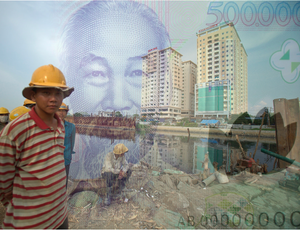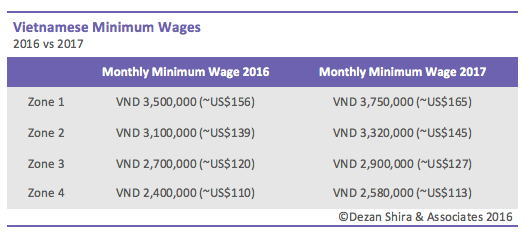Vietnam Announces 7.3 Percent Wage Hike for 2017
Editor’s Note: This article was originally published on August 30, 2016, and has been updated as of November 25, 2016, to include finalized wages passed by the Vietnamese National Assembly.

By: Anh Ta
Vietnam’s National Wage Council has decided upon a modest 7.3 percent average increase in monthly minimum wages across the country for 2017. From January, workers must be compensated between minimums of VND 2.58 million (US$113) to VND 3.75 million (US$165). This is the lowest annual increase since 1997 and seems to be a compromise between the employers’ proposed increase of 5 percent and that of workers which pushed for an 11 percent increase. The decision also seems to be in response to competition from fellow manufacturing powerhouses in the region and hence primarily an effort to maintain its attractiveness to foreign investors and businesses.

![]() RELATED: Dezan Shira & Associates’ Corporate Establishment Services
RELATED: Dezan Shira & Associates’ Corporate Establishment Services
Understanding Vietnam’s National Wage Council
2016 is the fourth year since Vietnam has shifted away from its previous model of setting minimum wage at the state level. Instead of a government-mandated wage, a policy last used in 2012, the responsibility has now been delegated to the National Wage Council, which includes representatives of employers, trade unions, and the government. Acting as an advisory body to the government, the Council allows the private sector and labor unions greater control over the process and showcases Vietnam’s progress toward a freer market. As such, the negotiation of a minimum wage each year takes into account subsistence needs of workers, analysis of the current economic and social developments, as well as real wages in the market.
Such progress does not only improve Vietnam’s investment and business climate, but also acts to boost Vietnam’s attractiveness to foreign investors. However, the effectiveness and fairness of such a practice is still debatable, as Vietnam still lacks formal legislation on minimum wages to protect the workers’ welfare.
Wage Hikes in Perspective
Wage hikes planned for 2017 are significantly less than the average annual increase of 15 percent over the last decade. At 7 percent, rates partially reflect a lower inflation rate of 2 percent seen during the past year. Debates, however, still remain as this increase allegedly covers just 90 percent of the minimum living costs in Vietnam. This new increase has received backlash from the public as well as calls for more transparent wage legislation in Vietnam.
Despite its domestic reception, the year’s low rise puts Vietnam in a competitive position among its more developed peers in the ASEAN bloc. Compared to Singapore’s monthly rate of US$706.50 or Indonesia’s US$199.80, Vietnam’s rate remains lower. However, considering Vietnam’s heavy reliance on labor-intensive industries such as garment production, a comparison with other competitors in such industries would be more apt. For example, Cambodia, an increasingly attractive hotspot for garment businesses, set its 2016 monthly rate at US$140. As such, despite being at the lower end of the spectrum in the region, Vietnam’s competitive edge provided by a low minimum wage might only be temporary.
![]() RELATED: Vietnam Outlines Customs and Tax Plans to Enhance Competitiveness
RELATED: Vietnam Outlines Customs and Tax Plans to Enhance Competitiveness
The Future of Vietnamese Competitiveness
In the long term, it is unlikely that Vietnam will be able to utilize wages as a means of achieving competitiveness. However, in light of the recent European Union-Vietnam Free Trade Agreement (EVFTA) as well as the Trans-Pacific Partnership (TPP) being signed, Vietnam has favorable prospects to complement its low minimum wage and to accelerate the growth of its manufacturing sector. In the short term, Vietnam’s partners in the EVFTA and TPP are likely to invest based on wages, thus cementing Vietnam’s position as a rising manufacturing hub and an economic power.
However, in the years ahead, low wage rates might become unsustainable due to the increasing role that labor unions play in minimum wage legislation and the mounting expectations of workers within the country. In addition, being a part of these favorable free trade agreements also compel Vietnam to pay more attention to workers’ welfare and working environments, factors that partners such as the EU or the US are highly concerned with. Vietnam’s increasing involvement in global trade, as seen in its participation in EVFTA and TPP, dictates the necessity of the delicate balance between creating a favorable investing environment and ensuring the welfare of its people.
The modest minimum wage increase will grant Vietnam a significant advantage in maintaining its attractive status to foreign investors. However, to tap into these opportunities, investors will need to pay close attention to legislative changes, understand their implications, plan for the possible effects. Our advisors at Dezan Shira have the expertise and experience of Vietnam’s legislative and investment climate, and can help you make strategic decisions. For more information and guidance, please contact us at vietnam@dezshira.com or visit our website.
|
Asia Briefing Ltd. is a subsidiary of Dezan Shira & Associates. Dezan Shira is a specialist foreign direct investment practice, providing corporate establishment, business advisory, tax advisory and compliance, accounting, payroll, due diligence and financial review services to multinationals investing in China, Hong Kong, India, Vietnam, Singapore and the rest of ASEAN. For further information, please email vietnam@dezshira.com or visit www.dezshira.com. Stay up to date with the latest business and investment trends in Asia by subscribing to our complimentary update service featuring news, commentary and regulatory insight. |
![]()

Annual Audit and Compliance in Vietnam 2016
In this issue of Vietnam Briefing, we address pressing changes to audit procedures in 2016, and provide guidance on how to ensure that compliance tasks are completed in an efficient and effective manner. We highlight the continued convergence of VAS with IFRS, discuss the emergence of e-filing, and provide step-by-step instructions on audit and compliance procedures for Foreign Owned Enterprises (FOEs) as well as Representative Offices (ROs).
 Navigating the Vietnam Supply Chain
Navigating the Vietnam Supply Chain
In this edition of Vietnam Briefing, we discuss the advantages of the Vietnamese market over its regional competition and highlight where and how to implement successful investment projects. We examine tariff reduction schedules within the ACFTA and TPP, highlight considerations with regard to rules of origin, and outline the benefits of investing in Vietnam’s growing economic zones. Finally, we provide expert insight into the issues surrounding the creation of 100 percent Foreign Owned Enterprise in Vietnam.
 Tax, Accounting and Audit in Vietnam 2016 (2nd Edition)
Tax, Accounting and Audit in Vietnam 2016 (2nd Edition)
This edition of Tax, Accounting, and Audit in Vietnam, updated for 2016, offers a comprehensive overview of the major taxes foreign investors are likely to encounter when establishing or operating a business in Vietnam, as well as other tax-relevant obligations. This concise, detailed, yet pragmatic guide is ideal for CFOs, compliance officers and heads of accounting who must navigate Vietnam’s complex tax and accounting landscape in order to effectively manage and strategically plan their Vietnam operations.
- Previous Article Vietnam News Brief: Wages, Business Registration, and the Trans Pacific Partnership
- Next Article Accounting and Bookkeeping in Vietnam – New Issue of Vietnam Briefing Magazine









